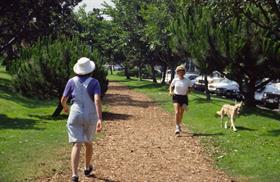More Than One Type of Fitness
 Physical fitness can be defined as “the capability of the heart, blood vessels, lungs and muscles to function at optimal efficiency.”
Physical fitness can be defined as “the capability of the heart, blood vessels, lungs and muscles to function at optimal efficiency.”
Fitness is a much broader concept that also embraces a person’s psychological well being and mental attitude. Persons can have mental, psychological, and emotional as well as the physical fitness.
Components of Physical Fitness
1. Strength.
Most people think that to be fit is to be strong. This is true, in a way; but strength isn't all there is to fitness. Strength is the capacity of a muscle to exert maximal force against a resistance. Strength training (exercising to develop strength) will result in some enlargement of muscle fibres and a relative increase in your ability to apply force. Properly conducted weight resistance programs (exercise with barbells for example) are the most efficient ways of gaining rapid strength.
2. Muscular Endurance.
Endurance is the capacity of a muscle to exert force repeatedly over a period of time. It is not the same as strength! Muscular endurance can also refer to holding a muscle contracted for a period of time. Your ability to do sit ups or pull ups is a measure of your muscular endurance. The distance which you can jog without stopping to walk is a measure of your muscular endurance. By doing these types of exercises and gradually increasing the repetitions, you will be able to increase your muscular endurance.
3. Flexibility.
Flexibility is you ability to use a muscle throughout its full range of movement. It is essentially your ability to move your joints. Someone who can touch their toes is much more flexible than someone who cannot. Exercises such as touching the toes which stretch muscles to their full extent are the best way of increasing flexibility.
4. Motor Skill Performance.
This is the ability of the nerves to receive and provide impulses which result in smooth, co ordinate muscular movement. This is evident in your ability to dodge, control balance, react and move quickly, etc. Motor skill exercises include such things as the vertical jump, agility run, squat thrusts, etc.
5. Cardiorespiratory Endurance.
This refers to the capacity of your heart, blood vessels and lungs to deliver nutrients and oxygen throughout the body. Vigorous exercise increases the cells need for oxygen. This means you must breathe in more oxygen and the heart must pump more through the body. Vigorous exercise is the best way to increase cardiorespiratory endurance. Be careful though - too much too soon is dangerous.
Stress Control Can be as Important
When people are under stress their bodies will respond in a way that generally works towards counteracting or overcoming the problems causing the stress, however it is possible to ignore the indications that stress is occurring, and thereby suffer from a breakdown in bodily functions.
Common signs of may include:
- Nervousness/’edginess’
- Nail biting
- Cold hands and feet
- Muscle tension
- Lack of energy/fatigue
- Headaches
Humans have instinctive actions when under threat just as all animals have, commonly referred to as "The flight or fight response". They will either run or fight when confronted with danger. In doing so, they burn up the stress hormones released in their bodies. People work themselves till their bodies respond with "signals" such as tiredness, appetite, etc. Then automatically they would react to these responses, for example by sleeping or eating.
Modern humans suffer physical arousal (i.e. physical changes to the body) when put into stressful situations such as: running late for work, driving in peak hour traffic, dealing with staff, getting work completed on time, arguing with their spouses, paying bills, etc. These things might not be real physical threats, but they can nevertheless bring about physical changes in the body. These changes tend to stay with us for a long period of time and are not easily removed through natural body reactions.
Modern humans with their new technology, do less physical work, stimulate themselves when tired (television, food, alcohol), and eat when they are not hungry, etc. This actually goes against all natural feelings and signals from the brain. Humans are actually depriving themselves, and this is a major psychosocial cause of stress. Another psychosocial cause of stress is "adaptation" overload where people are being faced by constant or rapid change whether it is social, cultural, technological, etc.
There are also biological causes of stress such as poor nutrition, and the effects of pollutants, drugs (e.g. alcohol, prescription and non‑ prescription drugs, tobacco, etc.) and loud noise on the body.
There are damaging effects to human bodies caused by such stress. These include reduced resistance to disease; pathological changes such as the development of ulcers, heart problems and emotional problems such as depression or aggressive behaviour.
There are three well-defined stages of stress -
- The alarm reaction stage when the body mobilises for action, and sends "signals" indicating stress is occurring.
- The resistance stage (adaptation). The body tries to adapt to overcome the stress. The stress response generally appears in a particular part of the body, for example in the brain or stomach.
- Exhaustion stage ‑ through continuous alarm reaction and resistance the body system or organ begins to breakdown, for example the development of an ulcer, or the onset of a heart attack.
Study our Fitness Leadership Course
[16/01/2025 02:26:37]